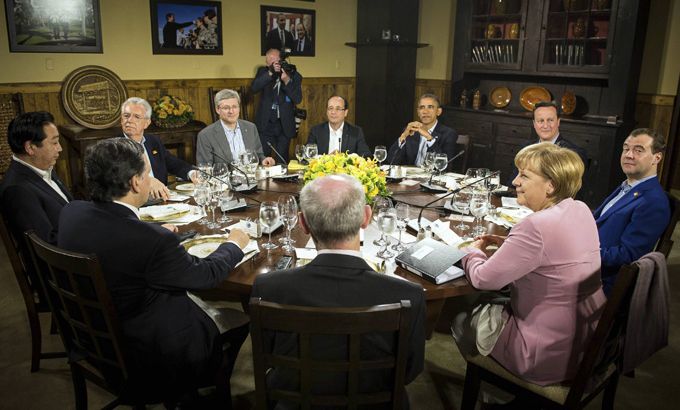
Does the G8 represent a modern world economy?
With China and India not represented in the G8, we ask if the group can deal with the current global economic problems.
Thirty seven years ago as the world grappled with a major economic crisis, leaders of six of the world’s biggest economies gathered in France.
|
“The biggest problem is the emphasis on growth and that’s the way it’s been … and the G8 epitomises that obsession with economic growth that of course is the most unsustainable aspect of the whole thing.” – Bryan Czech, president of the Center for the Advancement of the Steady State Economy |
Henry Kissinger, US secretary of state at the time said the G6 would give people a sense they are masters of their destiny and be a bulwark against the blind forces beyond their control.
In the intervening years the six has become eight with the US, Britain, France, Italy, Germany and Japan joined by Canada and Russia.
And as the eight leaders congregate at Camp David outside Washington, the agenda is similar to 1975 – economic crisis. As the Eurozone threatens to implode, fevered discussions are expected on how much pain should be inflicted in order to preserve the financial order.
Although the global economic scene has changed significantly since that first meeting – China is now the world’s second largest economy – but growing economic powers like India and China are not represented in this group of eight.
|
“It’s a very difficult time for a lot of the leaders who are going to be gathered at Camp David to be talking down a growth agenda because so much of the discussion going on in Europe at the moment is about restoring growth in countries that badly need it. “ – Willis Sparks, an analyst at Eurasia group |
Critics point out that the G8 is just one of many global institutions dominated by the interests of an old world order. They argue that radical change is needed to finally give people a sense that they really are masters of their destiny.
The organisers are at pains to stress the G8 meeting will be more than simply a group of powerful world leaders meeting in secret, where a major new food secrity initiative will also be unveiled.
On Friday, President Obama announced $3bn will go towards alleviating hunger in Africa.
“As the wealthiest nation on earth, I believe the United States has a moral obligation to lead the fight against hunger and malnutrition and to partner with others. So we take pride in the fact that because of smart investments in nutrition and agriculture and safety nets, millions of people in Kenya and Ethiopia did not need emergency aid in the recent drought,” Obama said.
“History teaches us that one of the most effective ways to pull people and entire nations out of poverty is to invest in their agriculture. As we’ve seen from Latin America to Africa to Asia, a growing middle class also means growing markets including more customers for American exports that support American jobs. So we have a self-interest in this.”
So what does the G8 represent in a modern global economy?And is it the organisation to deal with the current economic problems?
Inside Story Americas, with presenter Shihab Rattansi, discusses with guests: Raymond Offenheiser, the President of Oxfam America; Willis Sparks, an analyst at the Eurasia Group; and Bryan Czech, a visiting professor at Virginia Tech University and president of the Center for the Advancement of the Steady State Economy.
|
“We also discussed Africa and the Sahel, in particular, how we can deepen our cooperation to prevent conflicts, to deal with the food security challenges, and protect and advance democracy. And we agreed on the importance of continuing the D’Eauville partnership and supporting countries in the Middle East and North Africa working to transition to democracy, to improve governance, to create jobs, to expand trade and investment. Today’s complex challenges require continued leadership of the G8 counties working together.” Hillary Clinton , the US secretary of state, an the April 2012 meeting of the G8 foreign ministers |
___________________________________________________________________________________________________
FACTS
- Canada, US, UK, France, Italy, Germany, Japan and Russia are in G8
- The group, initially made up of six nations, first met in response to economic downturn of the 1970’s
- From G6, it became G7 when Canada joined the group in 1976
- The group became G8 when Russia joined the group in 1997
- G8 leaders are set to discuss poverty and food security in Africa, pushing public-private partnership
- They have promised aid for African nations at previous summits
- At the 2009 summit in Italy, G8 leaders pledged $22bn in African aid
- Less than a quarter of aid promised by G8 nations has been delivered
- US is likely to seek agreement on oil reserves release at G8
- Obama met new French president Francois Hollande ahead of the summit
- Hollande is attending his first major summit as French president
- G8 leaders will debate austerity and stimulus amid Eurozone crisis